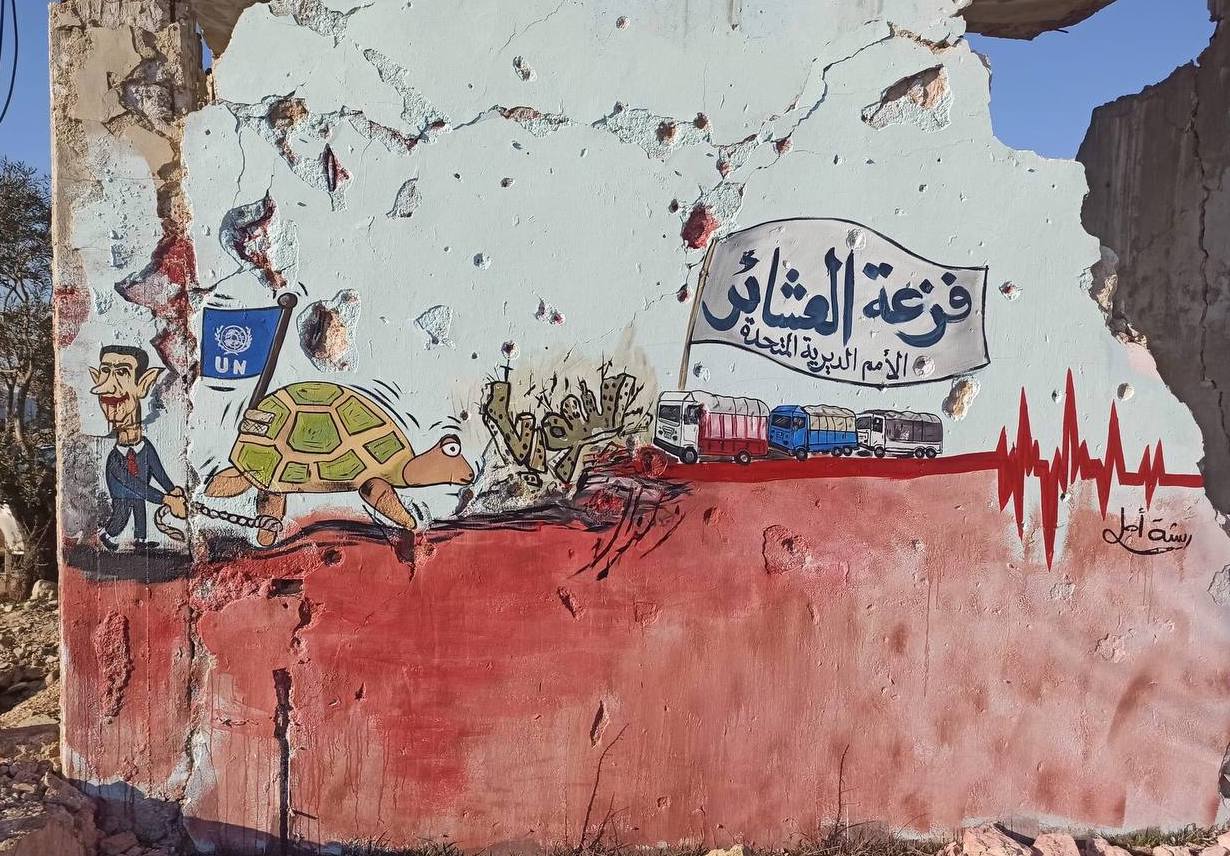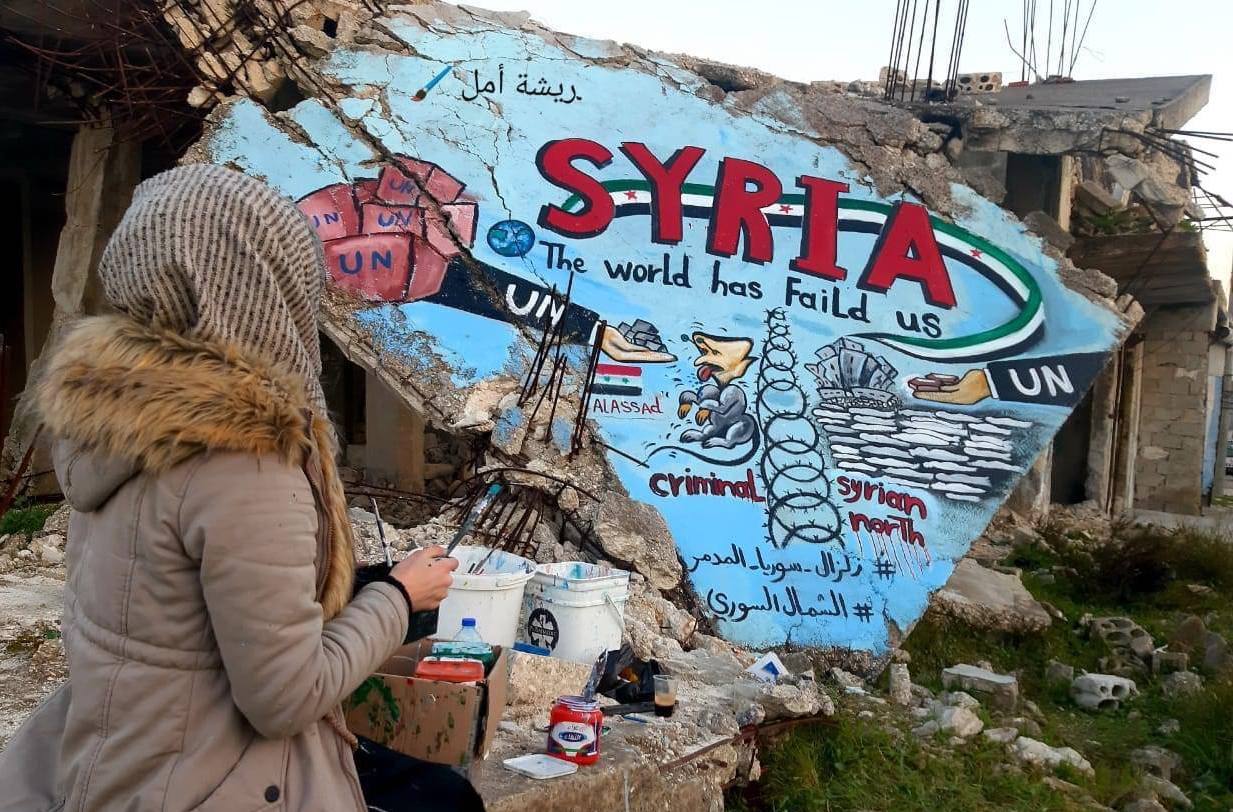An open letter and call for action addressed at policy-makers from European governments and at the EU level
We are Syrian and non-Syrian academics, researchers, analysts, journalists, practitioners, activists, writers. We address you as we want to raise awareness about the current situation in northwest Syria, a region that has frequently been neglected by the international community; condemn the disregard and inaction that have systematically prevailed, including after the recent earthquake; and call for urgent action.
The Kahramanmaraş earthquake claimed countless lives and torn families apart in both south Turkey and north Syria. At the time of writing, the death toll in both countries has surpassed 40,000 victims and, sadly, is expected to further rise in the coming days. In contexts of natural disasters, it is of vital importance that all kind of adequate aid is provided to those affected in a timely and equitable way, to assist in search and rescue operations as well as humanitarian relief. Aid should be provided to anyone in need everywhere, regardless of where they live; and it should be based on needs, as the most affected regions would require greater assistance. However, this is not what happened in opposition-held northwest Syria — currently the only region outside of Assad regime’s control. The assistance provided to those affected in northwest Syria in the aftermath of the earthquake has been way too inadequate — too little, too late. This is even more troubling if we consider that it is the Syrian region that has been most heavily affected by the seism, with over 4,300 deaths, 7,600 injured, and 7,400 buildings that have been fully or partially damaged as of Febuary 13. Towns that have been hit the most include Harim, Salqin (Idlib governorate), Atarib, Jindires (Aleppo governorate). A subsequent flood that hit the village of Al-Tlul, Idlib governorate, on February 11, lead to the evacuation of 7,000 residents.
The international response has been utterly inadequate vis-à-vis the extent of the emergency. The White Helmets’ appeals to the United Nations for urgent assistance fell on deaf ears, as either logistics or “bureaucratic reasons” were mentioned as the reasons behind the delayed response. Yet, at a time when UN officials lamented logistics hurdles — namely, damages to the road leading to the UN-authorized Bab al-Hawa border crossing — trucks and vans carrying bodies of Syrians who lost their lives in Turkey after the quake were crossing the border; and all other border crossings, although not UN-authorized, always remained viable. For 5 days, “no meaningful aid arrived” to the northwest — a timespan that was critical, as many more lives could have been saved if international rescue teams, adequate machinery, medicine supplies, and other necessities had arrived earlier. As denounced by Raed Al-Saleh, head of the White Helmets, “UN’s failure to act quickly to save Syrian lives in the face of a humanitarian catastrophe is utterly shameful.” It is equally troubling that, in the most critical hours and days after the quake, the international community, including EU countries, did not find ways to join efforts and deliver a prompt, common response to the crisis in northwest Syria in face of the UN’s inertia.
The inadequacy of UN’s response to the emergency in northwest Syria comes on top of and exemplifies a patten of inertia that has been evident over the past years, in a context of politicization and weaponization of humanitarian aid in Syria. Even before this earthquake, northwest Syria — a region where 4,6 million people live — has been in dire need of humanitarian assistance, with over 4 million people in need, 3 million people in a condition of food insecurity, and almost 3 million internally displaced people — over 60% of them living in camps. The amount of UN’s aid that reached the region has always been limited and insufficient. In 2014, the UN Security Council approved Resolution 2165, aimed at delivering humanitarian aid to opposition-held areas without Damascus’ authorization through four border crossings (Bab al-Salama and Bab al-Hawa via Turkey, al-Yaʿrubiya via Iraq; Al-Ramtha via Jordan). However, over the past years, Russia, an ally of Assad, has used its veto power (with the backing of China) to further restrict the number of border crossings authorized for the deliverance of UN aid, leaving only the Bab al-Hawa crossing. There are fears that the use of the Bab al-Hawa crossing could be prevented as well, in the future. Russia, as well as the Assad regime, insist that all aid — including aid for opposition-held areas — should be channeled through Damascus, that would be in charge of its distribution. But this cannot be a credible alternative to cross-border aid in any way.
First of all, there is no guarantee that such aid could reach those in need, and even fewer guarantees that it would reach people in northwest Syria. Damascus has a grim track record in terms of weaponization of humanitarian aid and restriction to its access, with well-documented cases of starvation and punishment of opposition-held areas at the hands of the regime, such as in eastern Ghouta. Misappropriation and diversion of aid by Damascus is equally well-documented. As highlighted by a report by Human Rights Watch, its “regular restrictions on the access of humanitarian organizations to communities in need or receipt of aid, selective approval of humanitarian projects and its requirement to partner with security-vetted local actors […] ensure that the humanitarian response is siphoned centrally through and for the benefit of the abusive state apparatus, at the cost of preventing aid from reaching the population unimpeded”. A recent study by the Syrian Legal Development Programme (SLDP) and the Observatory of Political and Economic Networks (OPEN) has unveiled troubling issues in the way that UN’s humanitarian aid is handled in (regime-held) Syria, as between 2019 and 2020, almost half of UN’s procurement funding ended up in companies linked to human rights abuses committed by the Assad regime and its allies. Finally, beyond the issues outlined above, the so-called “cross-line aid” — that is, aid channeled via Damascus and intended for opposition-held northwest Syria — addresses only an extremely tiny proportionof actual needs; and an overreliance on crossline aid now could further jeopardize the renewal of the UN cross-border mechanism next July.
Northwest Syria would logically risk greater humanitarian blackmailing. Mistrust on behalf of residents in northwest Syria is understandable, given the pattern of crimes and human rights abuses committed by Damascus. Suffice it to remember that the regime and its allies have been responsible for 90% of civilian deaths over these twelve years; and that among the communities affected by the earthquake in northwest Syria, many people have already endured forced displacement, bombings, use of chemical weapons, massacres, arrests, and torture on behalf of the regime and its allies. The earthquake emergency has magnified a pre-existing humanitarian crisis, making the adoption of a joint, rapid, and effective solution to deliver aid to northwest Syria even more urgent. While in the last days aid from Qatar, the Kingdom of Saudi Arabia, Kuwait, and Iraqi Kurdistan has reached northwest Syria via the border, no cross-border aid from the EU, European governments, or other Western countries, has done so at the time being. Monday evening’s announcement by the UN, stating that Damascus temporarily “allowed” the use of two additional border crossings with Turkey (Bab al-Salama and al-Raʿi, outside of regime control) for a period of three months, epitomizes the very issue of politicization of humanitarian aid and raises questions. It is a political move, and it comes too late, one week after the earthquake; it shows “UN’s insistence on waiting for the Syrian regime’s permission” before taking meaningful action; and it casts a shadow on future provision of humanitarian aid and the way it could be weaponized once again.
In light of all stated above, we demand policy-makers from European governments and at the EU level to promptlyensure that all kinds of adequate aid and assistance is immediately delivered to northwest Syria, using all viable border crossings into northwest Syria, unhindered and without time restrictions. We also fully support The Syria Campaign’s petition demanding the UN that all border crossings are used to provide immediately all necessary aid, equipment, and technical support on the ground in northwest Syria.
Among the most pressing needs, there are medicines, mobile clinics, tents and prefabricated houses, support for hospitals, milk for children, means for heating, winter clothes. As long as the UN Security Council remains paralyzed by a deadlock, all other avenues to provide cross-border aid should be explored. For instance, a team of leading international jurists has researched in depth UN’s deliverance of cross-border aid, concluding that, even in the absence of a resolution from the UN Security Council, there would be no legal obstacle to UN cross-border operations. In their words, “[o]verly cautious interpretations of international law should not risk the lives of millions who continue to rely on cross-border aid in the north and north-west, nor should they be allowed to change and politicise the landscape of International Humanitarian Law as it stands today. Not doing so risks creating a historic, dangerous precedent […].” Syrian communities, especially in the northwest, have all the rights in the world to feel angry and disillusioned at the international community’s general inertia in these years, and even more now. Sadly, those who have already lost their lives after the quake cannot be brought back. The least that European governments can do now is committing to addressing the current needs of those affected.
We invite everyone supporting this open letter and call for action to sign it here:
https://forms.gle/AhhgMazVdi7xY7CX6.
We also invite you to circulate it among your networks of friends and colleagues. You can use the hashtags #Save_Northern_Syria أنقذوا_شمال_سورية# on social media to raise awareness about the situation in northwest Syria.
For more information please contact silvia.carenzi@sns.it
February 14, 2023

Cover photo: © The Syrian Collective 'ريشة أمل'

